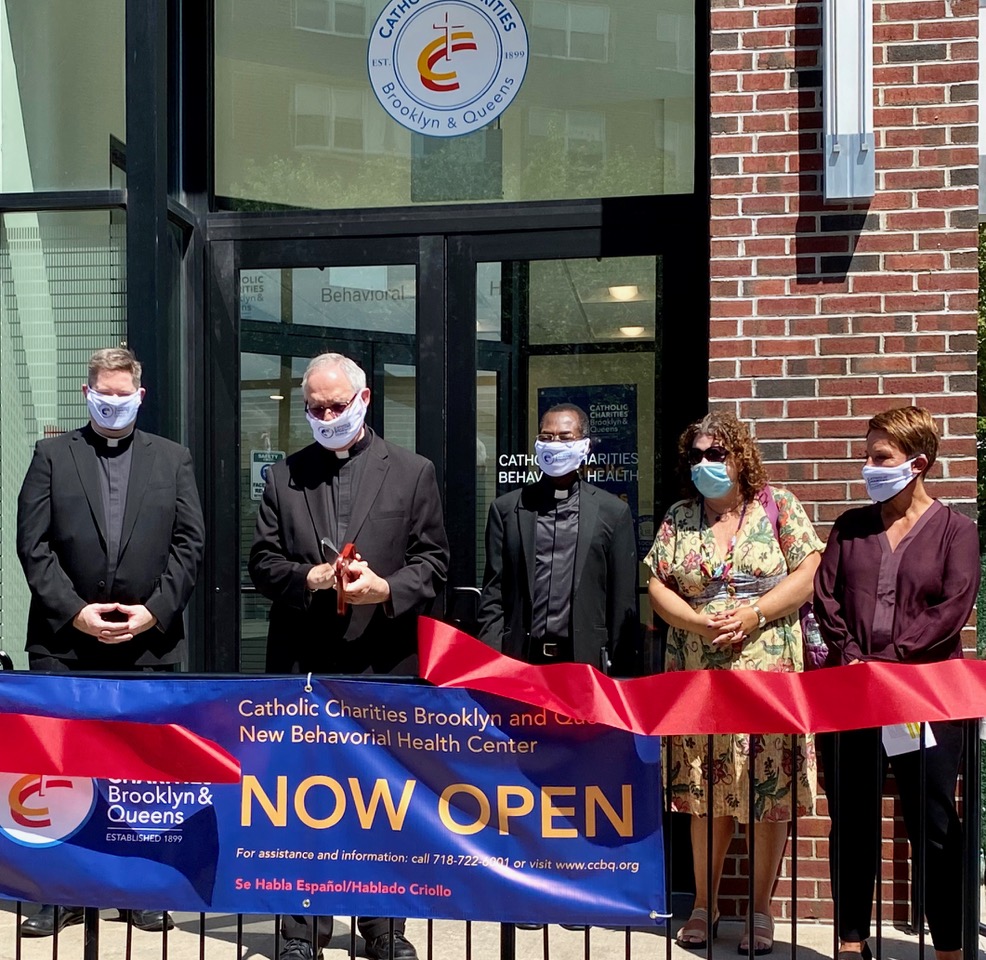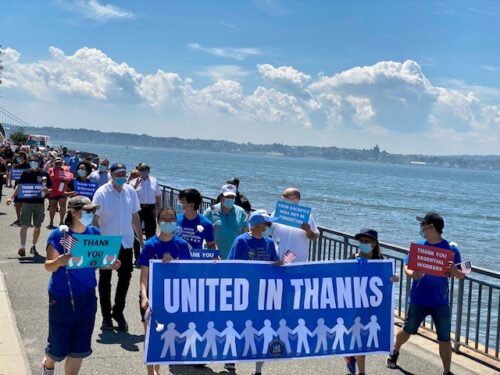
MANHATTAN — COVID-19 has eased its death grip on New York City, but while first responders worry about a “second wave,” mental health professionals prepare for more grief wrought by post-traumatic stress disorder and other stressors.
PTSD is severe anxiety after traumatic events like combat, natural disasters, or a global pandemic. Last week paramedics described watching the city’s coronavirus death toll swell to nearly 20,000 people by early August and with horrific speed.
“That really messed with us,” said Lt. Anthony Almojera of the city’s emergency management service. “These people were breathing and talking to us. We thought, ‘Oh, OK, they’re going to make it.’ But by the time we got them to the hospital, they were dead.”
Suicide, Almojera said, took four EMS members since the virus hit New York in February. Among them was Lt. Matthew Keene, assigned to the Bronx. Almojera said the fallen likely had other problems, but EMS colleagues saw how the surging COVID deaths haunted them.
Catholic Charities of Brooklyn and Queens offer help for many stressors that can rob a person of happiness, confidence, or a feeling of security.
“Seeing so many people die has brought a whole lot of hopelessness,” said Claudia Salazar, CCBQ vice president for Clinics, Recovery, and Rehabilitative Services.
“What we’re seeing right now is people in survival mode,” she added, “kind of processing what to do. But we’ve also seen higher rates of anxiety, depression, and substance abuse.”
And, while the city has seen dramatic drops in COVID-19 hospitalizations and deaths, Salazar said, “I think the mental health crisis hasn’t reached its peak.”
Anxiety from the virus also afflicts other front-line personnel, especially doctors, nurses, firefighters, and police, Salazar said.
According to the U.S. Department of Veterans Affairs, traumatic events are widespread, and most people face them in life.
But the agency also reports only about eight people out of 100 experience actual PTSD. Trained mental health experts look for key symptoms: flashbacks, avoiding other people, abrupt changes in beliefs or feelings, or becoming startled by sudden noises or sights.
Patients might also experience anger, sleeplessness, or obsessing about the trauma. Sometimes the symptoms first appear many months after the event, the VA said.
Non-PTSD anxiety also is very debilitating and Salazar said this could afflict anyone. She said some people might fret how to take care of their families after losing their jobs in the pandemic. Also, disease survivors can be traumatized by the COVID-19’s respiratory ravages, she said.
That concern is supported by a report published Monday from San Raffaele Hospital in Milan, Italy, where researchers monitored 402 COVID-19 patients who showed various mental health disorders.
The report stated that 28 percent of the patients had PTSD, 31 percent suffered depression, 42 percent struggled with anxiety, and 40 percent dealt with insomnia.
The report, published in the journal, Brain, Behavior, and Immunity, quoted a patient who lamented that panic attacks throttled breathing more than the disease.
“It was terrible,” the patient said. “Panic made me suffer more than COVID.”
Back in Brooklyn, trained professionals offer help at CCBQ’s new Behavioral Health Center in Brooklyn’s Flatbush neighborhood.
Salazar said it’s a one-stop-shop for mental health assessments, counseling, and referrals to other programs. For example, unemployed clients can get food or housing assistance. A medical clinic and a pharmacy help those who lost health insurance with their jobs.
The center opened nearly a month ago on Flatbush Avenue, followed by a ribbon-cutting last week. It provides a single roof for CCBQ’s behavioral health and addiction treatment programs, which previously had different locations.
“Often they’ll come in crying,” Salazar said of the center’s new clients, “but we’ll see them leave smiling.”
COVID-19’s daily deaths in the five boroughs spiked at 597 on April 7, according to the city’s Health Department. The latest data also shows eight deaths reported on July 28.

But the possibility of a “second wave” has heaped more stress on paramedics who can’t forget what they’ve seen since February.
“It’s like a vapor trail,” said Almojera. “It leaves an imprint on your brain, and it’s cumulative.”
Almojera, assigned to Brooklyn, also serves as vice president of the Uniformed EMS Officers Union, Local 3621. He said some paramedics turn to drinking to cope, while others might eat too much.
“I’ve gained 25 pounds since COVID, and I don’t sleep through the night,” he said. “I used to think I had a handle on it. But none of us have any experience with this.”
Not even the September 11 terrorist attacks, Almojera said, inflicted such mental turmoil.
“9/11 was a tragic experience, but it was a single experience,” he explained. “The call volume spiked in one day, but then the event was over,” Almojera said. “With this, the call volume went from 3,000 to 4,000 a day (in all five boroughs) to 6,000. It was like an explosion — boom! And it stayed that way for at least two months.”
Almojera added that an EMS station in New York City typically sees one, sometimes two, cardiac arrest calls per day.
“But with COVID, that jumped to 13 within a 16-hour shift,” he said. “That’s almost one per hour.”
Paramedic Angie Alburquerque, like Almojera, works at EMS Station 40 in Brooklyn’s Sunset Park neighborhood. She added another perspective.
“In five days,” she recalled, “I saw 37 cardiac arrests, and all were DOA [dead on arrival].
“Mostly, when we’re alone, usually as our heads hit the pillow, all those thoughts start filling your head, and you think, what do you do with them now?”
Father Bryan Carney, a hospital chaplain at Flushing Hospital Medical Center in Queens, helped scores of dying COVID-19 patients and their families. That is, right up until the virus leveled him in March.
On Monday, Carney said he’s still recovering, but he’s concerned his lungs won’t heal completely. Yet he always urges others to take heart; God will deliver them from stress, anxiety, and viruses.
“I went from being a minister to being ministered to,” Carney said. “And now I take nothing for granted. Every day, every relationship — they’re all precious to me.
“And God is right here with us. He’ll use the talents of many to find cures, and he’ll get us through this. But it will be on his time, not ours.”
